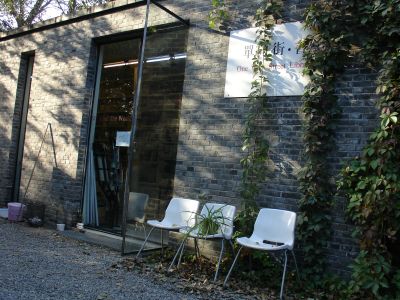
Back in One Way Street Library, a library and bookstore that my Beijing friends have started some years ago. The main venue is at the margin of Yuan Ming Park in the northwest of the city, but there is also a downtown branch. From Yuan Ming Park on clear sky days the mountain range seems very close, but in the garden of the bookstore you only see the trees and hear the peaceful chatter of the customers.
Normally Sunday is salon day. Then scholars, writers or artists are invited for giving talks. Without understanding much of what is going on I have already witnessed the presentation of a poet, a movie director, a former head of a business newspaper, a Xinjiang folk ensemble. Last sunday one of China’s most famous bloggers, Wang Xiaofeng, presented his new book, a chinese language encyclopedia of western rock music. In December I myself am going to give a little talk in the downtown store.

Today is owner’s meeting. W. is going on maternal leave, she has last ideas and instructions for the time of her absence, to be presented to the co-owners and the employees. Even though we’d had an extended Dim Sum brunch together this morning, the voracious girl in her belly is demanding her toll and I’m sent to the neighbouring garden restaurant to bring some fried rice.
There I am greeted by a cheerful group of maybe 15 Chinese, male and female, sitting at a huge table showing the chaotic and still tempting remains of a big and delicious lunch. Turns out they are all Tai Ji teachers, some of them having come from as far as Australia to meet and celebrate the launch of a new instructional book (I’ll be given a copy later). While I’m waiting for the takeaway food they invite me for a drink and toast to my health. After some discussions, one of them is sent to show me the whole Tai Ji form of their school. Fortunately I’ve brought my video camera, so here I proudly present Master Wang Jianhua and his beautiful and impressive skill:
Part 1
Part 2